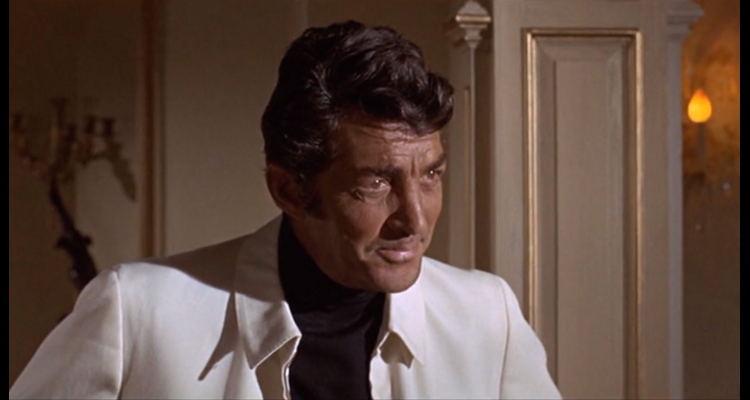Dean Martin
A suave and handsome Italian crooner, Dean Martin had a sharp wit and tipsy stage presence that turned him into one of Las Vegas's most revered performers for nearly four decades.
Born in Steubenville, Ohio, in 1917, Dino Paul Crocetti worked briefly as a blackjack dealer in an illegal casino. In 1946, having changed his name, he teamed with young comic Jerry Lewis to form one of the great musical comedy acts of all time, appearing in nightclubs, films, and radio and television shows. The duo ranked as one of the Las Vegas Strip's most popular acts until Martin, tired of the role, stepped aside in 1956 to pursue a solo career. The acrimonious split would last until the pair reunited briefly more than twenty years later on Lewis's annual Labor Day weekend telethon for the Muscular Dystrophy Association, and once more for a show on Martin's birthday in 1989.
As a solo act, Martin opened at the Sands in 1957. His loose, easy style and his cunning way with a ballad cemented his status as one of the Strip's most popular performers. Soon, he signed a five-year contract with the Sands. Martin proved to be a top-notch comic in his own right, and his solo shows at the Copa always featured a showgirl wheeling out a drink cart stocked with bourbon and scotch bottles. "I don't drink anymore, and I don't drink any less," Martin would announce, although his seemingly excessive drinking was viewed as more of a prop than as reality.
In 1960, Martin appeared with friends Frank Sinatra, Sammy Davis, Jr., Joey Bishop, and Peter Lawford for legendary shows known as the "Summit at the Sands." Although well-rehearsed, these "Rat Pack" shows were seemingly free-form, featuring all manner of hi-jinks such as Martin lifting Davis under his arm and thanking the "NAACP for this award."
The clowning continued with the Rat Pack working two shows a night while filming the crime caper Oceans 11 by day. They would often retire to the lounge for post-show partying and, on more than one occasion, would trash a room at the Sands when not recouping in the resort's steam room. Martin's bathrobe bore the moniker "Dago" and the Pack's rowdy behavior only increased their popularity. Onstage food fights were not uncommon.
The Rat Pack era ended with Sinatra breaking with Lawford over relations with John F. Kennedy; Lawford's marriage to the president's sister was in trouble, and Kennedy distanced himself from Sinatra over controversies surrounding the singer, including his alleged mob connections.
Another factor in the demise of the Rat Pack was the change in ownership at the Sands, with Howard Hughes taking over and imposing restrictions on their budget and behavior. Sinatra left in 1968, moving to Caesars Palace, and in 1969 Martin signed a $200,000 per week contract with the Riviera Hotel, where he was a part-owner and entertainment consultant. He also did well in movies and television: he filmed four "Matt Helm" comic spy films and launched his own weekly NBC variety show. Martin also signed a long-term contract to play the 1,200-seat Celebrity Room at the MGM Grand Hotel in 1973.
However, by the 1980s, Martin's life began to take tragic turns. His kidneys began to fail and, in 1987, disaster struck when his son, Dean Paul, died in a California Air National Guard plane crash. Martin quickly lost his zest for life.
Blaming his kidney ailment, he skipped most of a concert reunion tour with Sinatra and Davis–Liza Minnelli filled in–but continued to work at the MGM (by then renamed Bally's) with diminishing results. He looked gaunt and barely recognizable, struggling through his hits and sometimes doubling over in pain due to what he termed a "bad hot dog." He sometimes would send members of the audience to the exits when he would sob about the loss of his son, "Why, God? Why didn't you take me instead?"
Martin made his last Las Vegas appearance in 1990 and died on Christmas Day, 1995. However, he left behind a legacy of being one of the most celebrated performers to grace a stage, in Las Vegas or elsewhere. Las Vegas Strip hotels dimmed their lights in his honor, and in 2005, a portion of Industrial Road just west of the Strip was renamed Dean Martin Drive.
Article Locations
Related Articles
Further Reading
None at this time.


